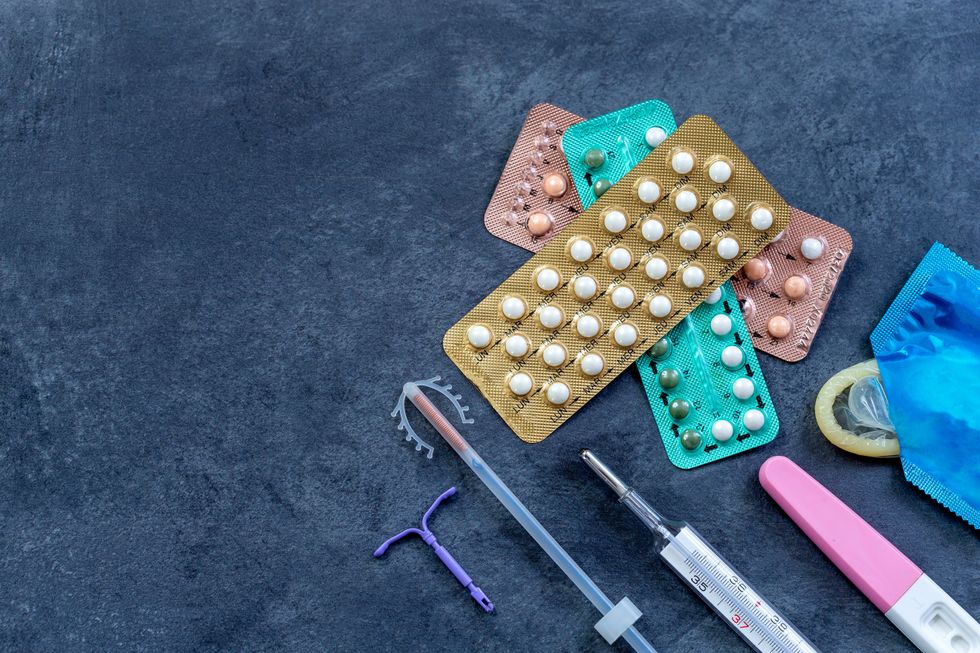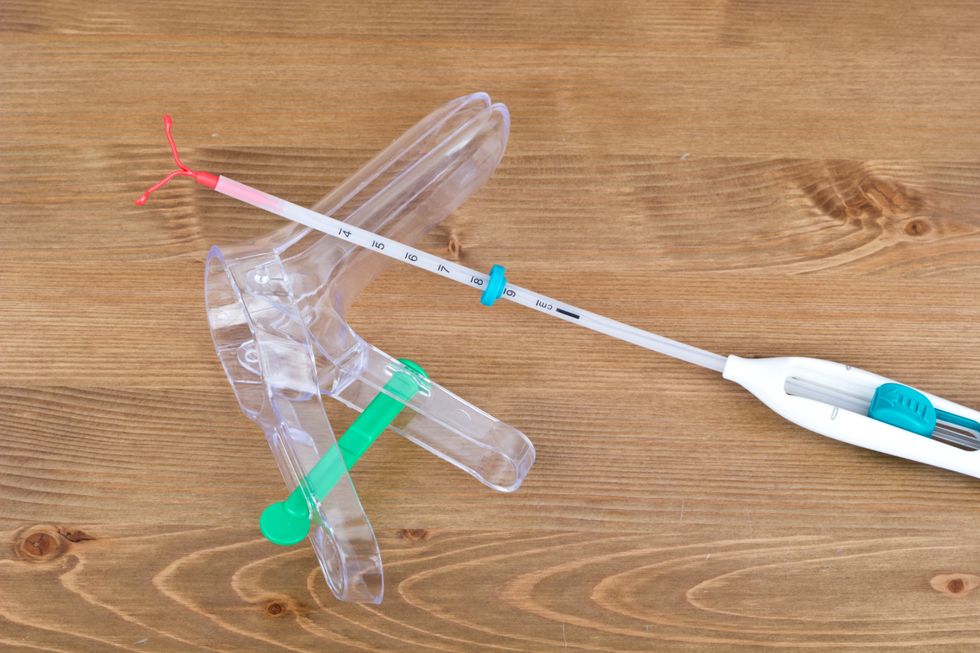I Had An IUD For Over 5 Years & Here's What You Need To Know About Getting One In Ontario
"IUDs are the most effective form of contraception."

A health professional holding an IUD.
What if I told you a tiny T-shaped device in your uterus could prevent pregnancy?
There are so many forms of birth control circulating around that it can be hard to decide which option is best for you and your body, but if you have a uterus and live in Ontario, here's everything you'll want to know about intrauterine devices (IUDs).
IUDs are contraceptive devices that are a form of no-fuss birth control inserted in a person's uterus for years at a time to silently prevent pregnancy at efficient rates.
In Ontario, there are two types of IUDs, and you can take your pick of copper or hormonal.
I had a copper IUD for over five years as my main form of birth control, and aside from a mildly painful insertion, this little device provided me with years of protection, and I didn't have to worry about monthly shots or taking a pill at the same time every day.
On the flip side, my periods were much heavier, and my cramps forced me to regularly work from my bed, so there are still some inconveniences you'll have to deal with depending on which form of birth control you choose to use.
That being said, I'd highly recommend it to anyone looking for a hormone-free alternative to birth control that has a bit of a higher threshold for pain or opting for the hormonal IUD instead.
If you're thinking of trying out an IUD, here's everything you need to know about IUDs in Ontario, according to a nurse practitioner at the Women's College Hospital in Toronto.
How effective are different types of IUDS?
IUDs are one of the most effective forms of "long-acting and "reversible" birth control, according to
IUDs are 99% effective in preventing pregnancy, and there are only 8/1000 unplanned pregnancies per year with the copper IUD and only 3/1000 unplanned pregnancies per year with hormonal IUDs, according to Bawden.
How do IUDs compare to other forms of birth control?

A table full of birth control options.
Jean Paul Chassenet | Dreamstime
If you're looking for high-performing birth control, IUDs are hard to beat.
"IUDs are the most effective form of contraception aside from abstinence or surgery," says Bawden.
Hormonal contraception options like the pill, patch, and ring are about 93% effective when used perfectly, and condoms are only about 87% effective in preventing pregnancies, but they do protect against sexually transmitted infections (STIs), so Bawden still encourages their regular use.
What are the pros and cons of IUDS?
If you're forgetful, IUDs are a great option for avoiding an unplanned pregnancy, but there are some cons as well.
Bawden says IUDs are long-acting, and after you take them out, you can expect to return to normal fertility in just a few weeks, not to mention they're forgettable and foolproof.
On the downside, this birth control does not protect against STIs, so you'll need to pair your IUD with condoms if you want to protect yourself from children and sexually transmitted infections.
From my personal experience with the copper IUD, my period was heavier, and my cramps were stronger, so you may want to take that into consideration as well.
According to Planned Parenthood, copper IUDs can cause heavier or longer periods, irregular periods, spotting, more cramping and back pain for days after it's inserted.
Although some hormonal IUDs can cause your period to be much lighter or go away altogether while they are inserted, according to Planned Parenthood.
So depending if you're looking for a hormone-free option or to lighten up your period, one IUD may be better suited for you than the other.
How much do IUDs cost in Ontario?
OHIP and the Ontario Drug Benefit program (ODB) cover hormonal IUDs, but they don't cover copper IUDs, so depending on which contraceptive device you're interested in, you may have to pay out of pocket, according to Bawden.
Bawden says copper IUDs range from $50 to $150, and if you're paying out of pocket for a hormonal IUD, they can cost up to $500.
Luckily most extended benefit plans cover both options, so you may be able to receive coverage through your health plan as opposed to the government.
But if you are stuck in a pinch, Bawden says that the company that makes the hormonal IUDs has a compassionate program if you can't afford one, so it's worthwhile to ask your health provider if that could be an option.
How is an IUD inserted and removed?

An IUD and speculum.
Getting an IUD inserted isn't the most fun activity, but it is a routine procedure you shouldn't be scared of.
Bawden broke down what you can expect from the procedure, and it's pretty similar to what you'd experience at a Pap smear.
"A speculum is inserted into the vagina, similar to what you experience during a pap test. The IUD device is then inserted through the cervix (the tunnel) and placed into the uterus. This procedure can be done in your family doctor’s office or a sexual health clinic."
The procedure can be uncomfortable, so Bawden recommends patients take ibuprofen beforehand to ease any cramping.
"The cramping is usually similar to bad period cramps, and there are options for more pain medication if needed. The procedure is very safe, with low rates of infection or damage to the uterus."
When it comes to getting your IUD removed, it's also done in a clinical office and just like an insertion, a speculum will be inserted, and the IUD is gently pulled out by its strings.
Bawden says that removal is "very simple, quick and not painful for most."
Can you get pregnant with an IUD?
No birth control is 100% effective, but IUDs are pretty close.
Only three to eight out of 1000 people with an IUD will get pregnant, according to Bawden, so your chances are pretty slim.
But you can always boost your rates of protection by using a condom in combination with your IUD.
Ectopic pregnancies can happen with IUDs, which is when a fertilized egg starts growing outside of the uterus, most likely in a fallopian tube, according to the Mayo Clinic. Bawden says the "risk of ectopic is exceptionally low" and that the risk with an IUD is lower than without it.
This interview has been condensed and edited for clarity.
This article's cover image was used for illustrative purposes only.
- Prescription Birth Control Is Going To Be Free In BC & Here's Everything You Need To Know ›
- Everything You've Ever Wanted To Know About Getting A Pap Smear In Ontario & Why It's Important ›
- A Birth Control Pill For Men Tested 99% Effective & It's Moving A Step Closer To Reality ›
- Canada's New Pharmacare Plan Covers These Key Drugs & Some Provinces Aren't Happy About It - Narcity ›